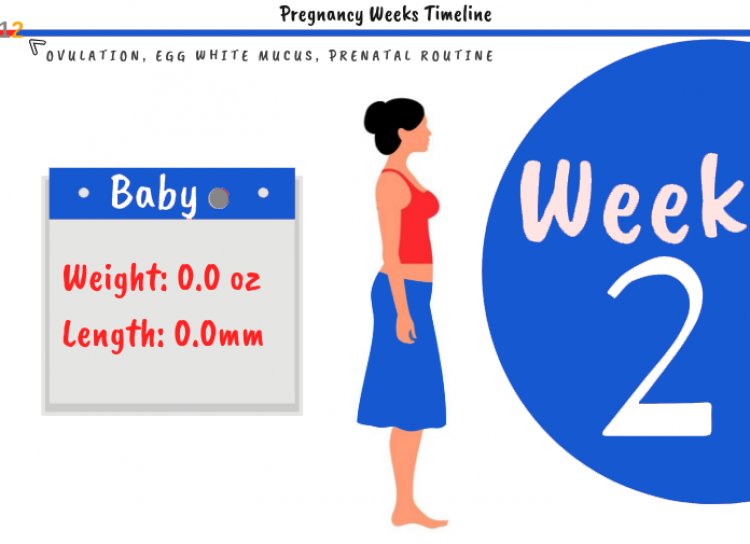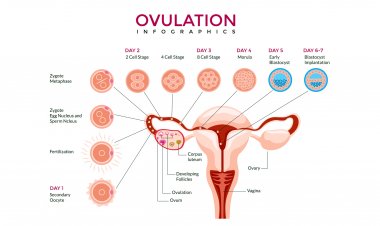2 weeks pregnant - what to expect?
Although at 2 weeks pregnant you may feel that everything is fine, it can take some time to be sure that you are pregnant. But, with some time effort, and a little luck, you and your partner can make the most of your chances of getting pregnant successfully.

In the second week of pregnancy, some complex processes are taking place in your brain and reproductive organs. Although you may not see what is happening and you may only feel a very slight tingle, being 2 weeks pregnant could be just the beginning of a chain of events that is about to turn your baby's birth into reality.
Ovulation
- Every month, one egg will be released from one of your 2 ovaries. This happens in turn, and some women release more than 1 egg per menstrual cycle. The ovum lies on a "bed" of fluid called a follicle. The follicle is affected by a certain hormone that determines when it should burst so that the egg is received by the fallopian tubes. Although many follicles start the process of maturation of the egg each month, only one dominant follicle in 20 does this work.
- Also, while your follicles are busy maturing an egg, the lining of your uterus is building up. Estrogen is released by specific cells in the follicle and helps prepare your uterus to receive a fertilized egg.
- If your egg is not fertilized by your partner's sperm, the thick layer of blood inside your uterus is no longer needed and will be expelled from the body during your next period.
When will you ovulate?
Most women have a 28-32 day cycle, although a few days more or less are considered normal periods. Ovulation usually occurs around the 14th day after the first day of the last period. Women who have cycles that are longer or shorter than 28 days will have different ovulation times.

How do you know when you are ovulating?
There are some subtle things that you can know when you are ready to ovulate. These things are different for every woman and your experience may be different from another woman's!
- Some women have an increased ability to perceive smells that they did not have before.
- Pain around the pelvis. It is called Mittelschmerz, which is a German word that means 'pain in the middle part'.
- Changes in cervical mucus. The purpose of these changes is to allow the sperm to travel through the cervix more easily to the egg than the normal pattern. Fertile mucus may look like egg whites or look more watery and slippery than it actually is. could.
- Some women have an increased libido and feel more sexually attracted to their partners. On a biological level, at the most fertile times of a woman's cycle, it is nature's way of creating a desire between couples to have sex.
- There are saliva and urine tests available that can help alert a woman to the fact that she has ovulated. These are available in jazz medical stores.
- Increase in normal body temperature. During ovulation in a woman, her normal body temperature rises by a few degrees. Charting your temperature over a few months can help you see the pattern of change that helps you know when you're most fertile.
- Eggs are capable of fertilization 12-24 hours after they are released from their follicles. Sperm can live much longer than this, up to 3 to 5 days. This means that they can wait a few days for a favorable chance of successful fertilization with the egg. Therefore, if you are trying to conceive, it is best to have sex a few days before or after you ovulate.
Fertilization
Fertilization of the egg usually occurs inside the fallopian tube with a single sperm and this happens in the third week of pregnancy. It is important that the zygote (single-cell) continues to move down towards the uterus as it quickly begins to divide and the cells multiply.
Things to remember
- Ovulation, as surprising and complicated as it may be, is only half of the process in terms of the formation of the baby and 2 weeks gestation. When your partner ejaculates, there are about 100-300 million sperm in his semen. But only one sperm is needed at that right time to fertilize your egg, and then the rest of the sperm don't try to.
- If you don't conceive in the first month of your attempt or even after that, there is nothing to worry about. It may take some time to understand your cycle and your most fertile period. There is only about a 20% chance of getting pregnant each month and many couples take 12 months or more to conceive!
- You may also find yourself to be more infatuated or sensual, have a higher libido, or find your partner more attractive than at normal times. Then you might not even care about his annoying habits. However, not at all for this week.
- Your baby hasn't conceived this week, even though you're legally two weeks pregnant. However, when you ovulate, it is likely. All of your baby's genetic information resides in a single cell that you release from one of your ovaries in the middle of your cycle.
This week's advice
- If you smoke cigarettes, stop. Nicotine can affect fertilization and reduce the chances of pregnancy in some women.
- If you want to get pregnant, spend time with your partner. In your busy life, you may have to do some planning and preparations for this.
- If you haven't started in your first week, now is the time to start taking prenatal vitamins containing folic acid. The recommended dosage in early pregnancy is 500 mcg daily. Consult your doctor before starting any course.

 mybabycare
mybabycare 















